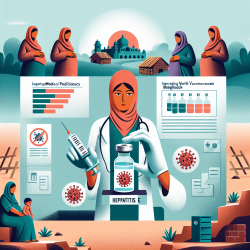As practitioners in the field of speech-language pathology, we are often faced with the challenge of understanding how various factors impact language development in children. A recent study titled "The effect of schistosomiasis and soil-transmitted helminths on expressive language skills among African preschool children" provides valuable insights into how these parasitic infections affect expressive language skills. Here, we will discuss key findings from this research and explore how you can apply these insights to improve outcomes for the children you work with.
Understanding the Study
The study conducted by Mazibuko and Chimbari (2022) focused on isiZulu-speaking preschool children in rural South Africa. The researchers examined the impact of schistosomiasis and soil-transmitted helminths (STH) on expressive language skills. The study involved 106 children aged 4 to 6 years and used the Developmental Language Test, adapted to be culturally and linguistically appropriate for isiZulu speakers.
Key Findings
The study revealed several significant correlations:
- Schistosomiasis negatively impacted vocabulary and narrative skills.
- STH negatively affected vocabulary and color identification skills.
- Age was positively correlated with improved language skills, indicating that older children performed better.
- Interestingly, boys performed better than girls in vocabulary subtests, contrary to many other studies.
Implications for Practitioners
Understanding these findings can help you tailor your interventions more effectively:
- Early Detection and Treatment: Since parasitic infections can significantly impact language development, early detection and treatment are crucial. Collaborate with healthcare providers to ensure children receive timely medical care.
- Focus on Memory and Narrative Skills: Given the impact on narrative skills, interventions should include activities that enhance verbal working memory and storytelling abilities. Techniques like story retelling and sequencing activities can be beneficial.
- Consider Age and Gender: Customize your approach based on the child's age and gender. Older children might benefit from more complex language tasks, while younger children might need foundational vocabulary building.
- Holistic Approach: Incorporate nutritional and general health assessments into your practice. Malnutrition and poor health can exacerbate language delays.
Encouraging Further Research
While this study provides important insights, it also highlights the need for further research, especially in diverse linguistic and cultural contexts. As practitioners, staying informed about the latest research and contributing to it can significantly enhance our understanding and interventions.
Conclusion
The study by Mazibuko and Chimbari underscores the importance of addressing health issues like schistosomiasis and STH to improve language outcomes in preschool children. By integrating these findings into your practice, you can make data-driven decisions that lead to better outcomes for the children you serve.
To read the original research paper, please follow this link: The effect of schistosomiasis and soil-transmitted helminths on expressive language skills among African preschool children.










